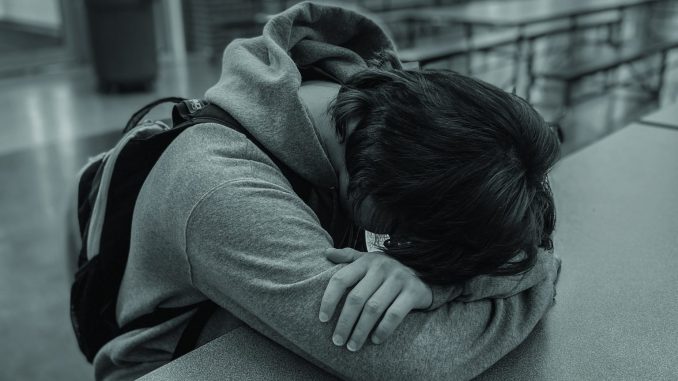
Written by Elly Herrick, Staff Writer

Sleep is like food for the brain, and today’s teens are starving.
In 2019, just 15 percent of teens got the 8 to 10 hours of needed sleep on school nights, National Sleep Foundation researchers reported.
The vast majority of teens suffer sleep deprivation, creating a public health epidemic that has spread across the nation making teens a danger to not only themselves but at times to others around them, the American Academy of Pediatrics reports.
Indian Trail High School & Academy junior Rebecca Dietz is one of those teens who needs more sleep.
“I’m less motivated,” said Dietz, a General Studies student who typically gets about four hours of sleep on school nights. “You aren’t as energized so getting up to go places isn’t as easy.”
Sleep deprivation affects emotional and physical health. When people lack sleep, they struggle to concentrate and remember. They also suffer moodiness, due to unbalanced hormone levels, and may be more prone to develop anxiety and depression, Stanford University researchers reported in a 2017 study.
“Sometimes I fall asleep when I need to be awake, and I also oversleep after multiple nights of minimal sleep,” Dietz says.
As a person loses sleep, the negative health impacts on the body grow. Prolonged sleep deprivation can cause high blood pressure, weight gain, and poor balance.
Night owl and Med-Sci Academy sophomore Connor Phillips is no stranger to bad sleep habits.
“I just can’t get tired,” Philips said.
Studies show that when people do work in their bed when it’s time to go to sleep, their brain plugs into work mode instead of powering down. Blue light radiating off phones and computers doesn’t help by sending signals that suppress production of melatonin, a sleep hormone.
“Don’t do it. It’s honestly the worst thing for you,” said Summer Gray, Communications Academy junior, referring to using electronics at bedtime.
Homework and stress are two main reasons teens forego sleep. While some turn to coffee or other caffeinated drinks to re-energize, those aren’t the healthiest solutions, medical experts report.
The body needs sleep so that overnight it can recharge and the brain can consolidate events of the day.
Sleep deprivation becomes even more dangerous when tired teens get behind the wheel of a car. Depending on how many hours of lost sleep, drowsy driving is the same as drunk driving, a 2016 study by the U.S. Centers for Disease Control & Prevention showed. In 2018, more than 90,000 crashes were attributed to drowsy driving, according to the National Highway Traffic Safety Administration.
ITA Communications junior Riley Werve worries about the dangers of drowsy driving.
“My life could be in danger if something goes wrong,” Werve said. “It’s dangerous and I have almost gotten into accidents sometimes because of how tired I am.”
“Pullover or drink water, if drowsiness sets in,” Gray recommends.
“Sometimes I’m so out of it and it’s so bad. I’ll have to stop and take a break and let myself refocus before I get myself hurt,” she said.
The National Sleep Foundation offers several tips to help teens deal with sleep deprivation. Developing a routine that will help prepare a body to fall asleep is vital to the process.
The foundation also recommends setting a regular bed- time with a sleep schedule. A nightly routine also may put the body into a rhythm which should create the urge to go to bed.
“I really just do what I got to do and see what happens,” Phillips said.
